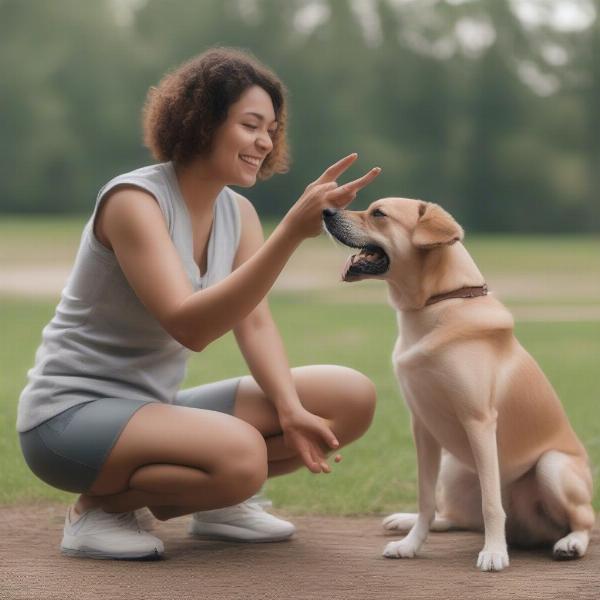Papitas para hot dog, or potato chips in English, are a common snack for humans, but can dogs eat them? While a small, occasional lick might not cause significant harm, potato chips are generally not recommended for dogs. This article will explore the reasons why, as well as suggest healthier alternatives to satisfy your dog’s craving for a crunchy treat.
Why are potato chips not ideal for your furry friend? The high sodium content is a primary concern. Excess salt can lead to dehydration, electrolyte imbalances, and even sodium ion poisoning in dogs. Furthermore, the high fat content in potato chips can contribute to obesity and pancreatitis, a serious inflammation of the pancreas. Many potato chips also contain artificial flavors, colors, and preservatives, which can be harmful to dogs. Some seasonings, like onion or garlic powder, are toxic to canines.
Healthier Alternatives to Papitas Para Hot Dog
Instead of offering your dog potato chips, consider these healthy and delicious alternatives:
- Fruits and Vegetables: Many fruits and vegetables make excellent treats. Carrots, apples (without the core and seeds), bananas, and blueberries are just a few examples. These provide essential vitamins, minerals, and fiber. Always ensure fruits and vegetables are washed thoroughly and cut into manageable sizes to prevent choking.
- Commercial Dog Treats: Choose high-quality, natural treats with limited ingredients. Look for options that are low in sodium, fat, and artificial additives. Single-ingredient treats like freeze-dried meat or fish are a great choice.
- Homemade Dog Treats: Baking your own dog treats allows you to control the ingredients and tailor them to your dog’s dietary needs. There are numerous recipes available online using simple, dog-friendly ingredients like sweet potato, peanut butter (xylitol-free), and oats.
Understanding Your Dog’s Nutritional Needs
Just like humans, dogs require a balanced diet to thrive. A diet rich in high-quality protein, healthy fats, and essential vitamins and minerals is crucial for their overall health and well-being. While occasional treats are acceptable, they should not make up a significant portion of their daily caloric intake.
What if my dog accidentally eats a potato chip?
If your dog snatches a dropped chip, don’t panic. A small amount is unlikely to cause serious harm. However, monitor them for any signs of gastrointestinal upset, like vomiting or diarrhea. If they consume a large quantity or exhibit concerning symptoms, contact your veterinarian immediately.
Toxic Ingredients in Human Snacks
Many human foods are toxic to dogs and should be avoided entirely. These include:
- Chocolate
- Grapes and raisins
- Onions and garlic
- Xylitol (artificial sweetener)
- Macadamia nuts
Always check the ingredients list before sharing any human food with your dog. When in doubt, it’s always best to err on the side of caution and choose a dog-specific treat.
Creating a Balanced Treat Routine
Treats should be given in moderation and as part of a balanced diet. They can be used effectively for training, rewarding good behavior, or simply showing your dog some love. Remember to factor treats into their daily caloric intake to avoid overfeeding.
 Dog Training with Treats
Dog Training with Treats
Dr. Emily Carter, DVM, a renowned veterinary nutritionist, advises, “Treats should be a supplement, not a substitute for a balanced diet. Focus on providing your dog with nutritious meals and use treats strategically for training and positive reinforcement.”
Conclusion: While the occasional potato chip might not be disastrous, it’s best to steer clear of papitas para hot dog as a regular treat for your canine companion. Opt for healthier alternatives like fruits, vegetables, or dog-specific treats to keep them happy, healthy, and satisfied.
FAQ:
- Can dogs eat sweet potato chips? Plain, unsalted sweet potato chips in moderation can be an acceptable treat, but avoid those with added seasonings or oils.
- What are some good training treats for puppies? Small, soft treats are ideal for puppies, as they are easy to chew and swallow. Look for single-ingredient options like freeze-dried liver or chicken.
- Are there any vegetables I should avoid giving my dog? Yes, avoid onions, garlic, chives, and leeks, as these are toxic to dogs.
- How many treats should I give my dog per day? Treats should not exceed 10% of your dog’s daily caloric intake.
- What should I do if my dog eats something toxic? Contact your veterinarian or a pet poison control center immediately.
- Can dogs have plain, cooked potatoes? Yes, in moderation. Avoid raw potatoes.
- What are some signs of an allergic reaction to a treat? Signs include itching, skin redness, vomiting, and diarrhea.
ILM Dog is a leading online resource for dog owners worldwide, dedicated to providing expert advice and practical information on all aspects of dog care, from breed selection and health to training, nutrition, and grooming. We offer a wealth of resources to help you provide the best possible care for your canine companion. For expert advice tailored to your dog’s specific needs, contact us at [email protected] or +44 20-3965-8624. Visit ILM Dog for more information.